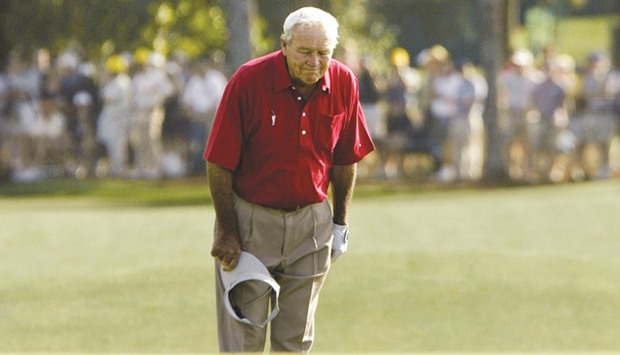Eighteen months ago in the clubhouse at Bay Hill, venue for the Arnold Palmer Invitational and the adopted winter home of this golfing icon, Rory McIlroy was approached. “Rory, if you need anything this week, you just let me know.”
McIlroy’s reply was as swift as it was pertinent. “Mr Palmer, I will never want for anything at all in life. That’s all because of you.”
While sadness, deep sadness, understandably surrounded the confirmation that Palmer died on Sunday afternoon at the age of 87, there was something poetic about McIlroy’s comment. On Sunday the Northern Irishman had just completed media duties on account of claiming $11.5m on the outskirts of Atlanta when he was apprised of Palmer’s death. McIlroy, like the rest of us, knew this was coming but was still deeply moved. A sporting pioneer is no more.
Every player at the top level of golf recognises Palmer’s role in their riches. Almost single-handedly, Palmer hauled golf into fresh commercial territory both with the late 1950s recognition of what television meant and a swashbuckling, risk-taking style which appealed to the masses. So, too, did a low-key background far removed from the snotty-nosed entitlement which has so undermined golf. Palmer, The King, was the people’s champion. He transcended golf, just as he did generations.
Palmer was the first player to earn $1m through on-course pursuits. By 2008, he commanded $30m via off-course projects. Palmer had a drink named after him, an unmistakable logo and was golf’s maiden brand; a brand which did not just survive decades and playing retirement, it actually grew. For fun, the seven-times major winner was a pilot. His last flight was in 2011, aged 81, from California to Orlando.
In this, a Ryder Cup week, it is worth reflecting upon the emotion and inspiration which surrounded the European team in 2012 following the death of Seve Ballesteros. That had been four months before matters got under way at Medinah, which offers some perspective as to what will resonate in the hearts and minds of the United States players from Friday.
“Arnold leaves an impact on the game and on sports in America that is unmatched,” said Davis Love III, the United States captain. “As we approach the Ryder Cup this week, our team will keep Mr Palmer’s family in our prayers and will draw from his strength and determination to inspire us.”
Palmer played six Ryder Cups, all marked by victory, and captained his nation to comfortable glory in 1975. This was merely reflective of individual brilliance. Palmer’s professional wins totalled 95. Between 1958 and 1964, 25 major starts saw 16 top fives, five runners-up places and those seven triumphs.
“You inspired millions, you changed the game,” said Jordan Spieth. Tiger Woods offered similar sentiment. “Thanks Arnold for your friendship, counsel and a lot of laughs,” said the 14-times major winner. “Your philanthropy and humility are part of your legend.”
Everyone involved in golf, from spectator to top-level performer, has their own Palmer story. My own involves sitting inside his cluttered office at Bay Hill last March, conducting an interview as the legend’s beloved labrador, Mulligan, lay at my feet. Palmer’s health was clearly failing but his handshake remained firm.
More notable was that unmistakable aura of greatness, the kind not common even among standard sporting royalty. One poorly-delivered question and I knew Palmer would destroy me in the manner golfers had once been accustomed to. Palmer’s trusted, lifetime lieutenant Doc Giffin presided over our every word.
Palmer bemoaned the over-tuition of golfers of this era (his father had been his only coach), bristled slightly at major-winning comparisons on the basis he could not compete in the US PGA Championship as soon as he turned professional and shook his head when assessing how far modern technology allows the ball to travel. He spoke enthusiastically about a golf course project in the Highlands of Scotland, which will continue apace, thereby illustrating Palmer’s business savvy even at a point where, privately, he most likely knew the odds against seeing it through.
This year at Augusta National, in realisation of failing health, onlookers realised they were saying farewell to Palmer as he posed on the 1st tee alongside Jack Nicklaus and Gary Player on the opening day of the Masters. But the truth, the admission of that, was understandably too painful for anybody to say publicly. Palmer donned the Green Jacket four times; between 1957 and 1964 he finished no lower than ninth at the first major of the year.
The final words here should belong to Nicklaus, who may be golf’s most decorated major winner but did not have anything even approaching the commercial savvy which set Palmer apart. “He was one of my best friends, closest friends, and he was for a long, long time. I will miss him greatly,” Nicklaus said. “He was more than a golfer or even great golfer. He was an icon. He was a legend. He took the game from one level to a higher level, virtually by himself.”
Tributes poured in on Sunday evening but, primarily, the message was of thanks. That is the true Arnold Palmer legacy.

Pal;mer
